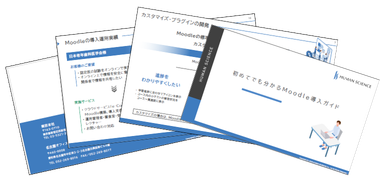2022.09.16
2026.01.13
[Moodle Basic Course Learning] How to Implement Moodle Security Measures? Introducing Basic Measures to Address Vulnerabilities and Enhance Security

Security measures are essential for the safe operation of Moodle. While Moodle, being open source, is flexible and user-friendly, there is also a risk of vulnerabilities being exploited if settings or operational policies are mishandled. This article clearly explains the security features and vulnerabilities of Moodle, as well as the basic countermeasures that administrators should understand. Whether you are planning to introduce Moodle or are already managing it, please be sure to check this information to help create a safe and reliable learning environment.
1. What is Moodle?

Moodle (Modular Object-Oriented Dynamic Learning Environment) is an open-source learning management system (LMS) used worldwide by educational institutions and companies to build e-learning environments. It offers high extensibility through plugins and includes all the necessary features for education and training, such as course management, learner management, quizzes, forums, and assignment submissions.
The main features of Moodle are as follows:
- ・Provided under open source licenses such as GPL, so no license fees are required.
- ・Can be hosted and operated by your own company or organization, allowing you to manage data and operational policies yourself.
- ・Flexible customization through plugins and themes is possible, allowing configuration according to operational purposes (schools, companies, training).
- ・Supports multiple languages and cultures, with a large user community worldwide.
Behind these advantages lies the freedom that comes from being open source, allowing flexible operation and maintenance by ourselves. On the other hand, because we operate it ourselves, we must also handle security measures and maintenance ourselves, which leads to the current theme of "security."
2. About Open Source

2-1. What is Open Source?
First, let's clarify the term "open source." Open source refers to a licensing model where the software's source code is made public, allowing anyone to view, modify, and redistribute it.
Key Points:
・No license fees; usage, distribution, and modification are permitted (provided license terms are followed)
・Even if the software provider discontinues the service, the community or your own organization can maintain and modify it
・Many users and developers can "view" and "inspect" the code
2-2. Characteristics of Open Source (From a Security Perspective)
Being open source has both "advantages" and "points to be cautious about" in terms of security.
Advantages
・Since the code is publicly available, it is more likely to be inspected and reviewed by many eyes, making bugs and vulnerabilities easier to discover.
・Because fixes and patches are provided by the community, vulnerabilities can often be addressed relatively quickly once discovered.
・In the case of in-house operation, you can set your own configuration and operational policies, enabling "custom strict security settings."
Points to be cautious about
・Because the code is open, there is a possibility that malicious attackers (third parties other than researchers) can also see the code, posing a risk that vulnerabilities may be discovered and exploited first.
・Since you need to operate and maintain it yourself, neglecting security measures makes you more vulnerable to damage. Unlike commercial services, you cannot completely entrust security to others.
・If you have introduced third-party add-ons such as plugins or themes, they can become weak points if they are not properly maintained.
3. Security Vulnerabilities of Moodle

Like many other systems, Moodle sometimes has "vulnerabilities (security weaknesses)" discovered. Here, we clearly explain the typical types of vulnerabilities to watch out for in Moodle and their background.
● Vulnerabilities Due to Neglecting Software Updates
Moodle core, plugins, middleware such as PHP and databases, all have new vulnerabilities discovered over time. If these are left without updates, there is a risk that attackers will exploit already known weaknesses.
Particularly Common Issues:
・Known vulnerabilities remaining in old versions
・Weaknesses in external libraries (PHP/JavaScript) directly affecting the system
・Old plugins becoming a risk to the entire system
●Vulnerabilities Originating from Plugins
Moodle’s functionality can be greatly extended through plugins, but there is a wide variation in plugin quality, and some have security issues.
Examples of Possible Risks:
・Inadequate permission management allowing unexpected users to access functions
・Insufficient input validation accepting data that burdens the system
・Unmaintained old plugins becoming breeding grounds for vulnerabilities
● Vulnerabilities Related to User Permissions (Due to Misconfiguration)
While Moodle allows very flexible permission settings, incorrect configurations carry the risk that other users may gain access to functions they should not be able to access.
Settings That Require Special Attention:
・Permissions for roles (teacher, manager, student, etc.)
・Permission overrides for each course and category
・Cases where system administrator privileges are granted to multiple people
●Lack of HTTPS Support and Communication Path Vulnerabilities
Moodle sites without HTTPS do not encrypt communication content. Therefore, the risk of eavesdropping and tampering on the network increases.
Examples of Impact:
・Leakage of login information
・Extraction of user information submitted through forms
●Vulnerabilities Caused by Server Configuration
Even if Moodle itself is secure, if the configuration or permissions of the operating server (web server, database, OS) are inappropriate, it can become an entry point for attacks.
Examples include:
・The moodledata directory is placed in a location accessible from outside
・File permissions on the web server are too broad
・Other applications on the same server are vulnerable
●Vulnerabilities Around Login and Authentication
Login and authentication are parts that are often targeted by attackers.
Common Issues:
・Users using weak passwords
・Lack of multi-factor authentication (MFA)
・Improper management of the password reset mechanism
4. Security Measures Recommended by Moodle

To operate Moodle with confidence, it is important to address several key security measures from the system implementation stage. Especially since online learning systems handle a large amount of user data and learning history, a single configuration mistake could lead to information leakage. Here, based on the official Moodle documentation, we have summarized the important points in an easy-to-understand manner for those considering their first implementation.
> Moodle Security Recommendations
●Regular Backups and Restore Testing
The most important security measures for Moodle are "regular backups" and "restore testing." Even if backups are being performed, there are many cases where it has not been verified whether restoration is actually possible. Establishing a system that can reliably recover in the event of a failure or incident is fundamental to Moodle operation.
Moodle undergoes minor version updates approximately every two months and major version updates about every six months, with bug fixes and security measures being promptly implemented. Few open-source software projects offer updates at this frequency, which is one of the reasons Moodle is considered a highly secure open-source LMS.
●PHP, Database, and Web Server Versions
It is important to keep not only Moodle itself but also the entire runtime environment in which Moodle operates—such as PHP, the database, and the web server—always up to date. Updates include not only new features but also critical security fixes for known vulnerabilities, and postponing updates can significantly compromise security.
The official Moodle website continuously provides information and warnings regarding the recommended versions and support status of the corresponding PHP, database, and web server. Since addressing vulnerabilities and managing updates of the middleware itself is the responsibility of the administrator, it is important to manage the security of the entire runtime environment alongside updating the Moodle core.
●Site-wide HTTPS and Strong Password Policy
Furthermore, it is essential to implement HTTPS across the entire site to encrypt communications. By providing all pages, not just the login page, over HTTPS, you can prevent eavesdropping and tampering of passwords and personal information. Additionally, it is recommended to establish a strong password policy, applying especially strict standards to teacher and administrator accounts. Since users with editing privileges can significantly impact the system, account management must be handled with great care.
●Separate Operation of Services and Systems
When using Moodle alongside multiple services or systems, it is important to configure them in a way that minimizes damage in the event of a breach, such as by separating servers or using different passwords. Preventing a single failure from spreading to other systems greatly enhances overall security.
●Continuous Monitoring
Continuous monitoring is essential even after implementation. By registering Moodle on the official site, you can receive security alerts and update information. This is a system you definitely want to set up to quickly obtain information on new vulnerabilities and promptly take necessary actions. Additionally, regularly reviewing security overview reports is also effective for early detection of configuration errors and potential risks.
●Permission Settings
When operating on your own server, setting permissions for files and directories is also extremely important. In particular, by configuring the moodledata directory so that it cannot be accessed directly from outside and only the web server user can operate it, the risk of unauthorized access can be greatly reduced.
5. Summary
Moodle is an open-source, highly functional LMS, but due to its flexibility, security measures and operational management must be handled by the implementer. In particular, if responses to vulnerabilities, updates, and proper initial settings are insufficient, it cannot be denied that the risks increase.
To operate Moodle safely,
・Perform regular updates
・Enforce a strong password policy
・Disable unnecessary features
・Properly manage permissions
These basic security measures are essential and must be consistently implemented.
However, it is not easy to continuously carry out these tasks with limited internal resources alone. Therefore, we recommend requesting support from Human Science Co., Ltd., an official Moodle certified partner.
Human Science provides,
・High-quality support by Moodle expert technicians
・Construction and operational support with security considerations
・Ongoing support for updates and vulnerability responses
・Optimal customization proposals tailored to educational settings and corporate training
and offers one-stop support necessary for Moodle operation.
If you want to use Moodle more securely or have concerns about updates and security management, please do not hesitate to consult with Human Science Co., Ltd., an official Moodle partner. By receiving expert support, you can create a safer and more comfortable learning environment.
Moodle Introduction Guide for Beginners

We explain the process of introducing and operating Moodle.
For the introduction and operation of Moodle, please leave it to Human Science, the official partner. We also introduce many achievements in Moodle implementation support.
Projects: Over 866
Companies, Schools, Organizations: Over 80 cases












